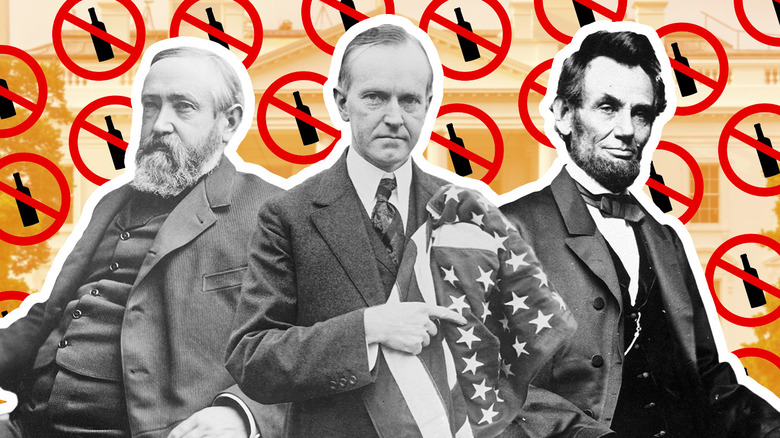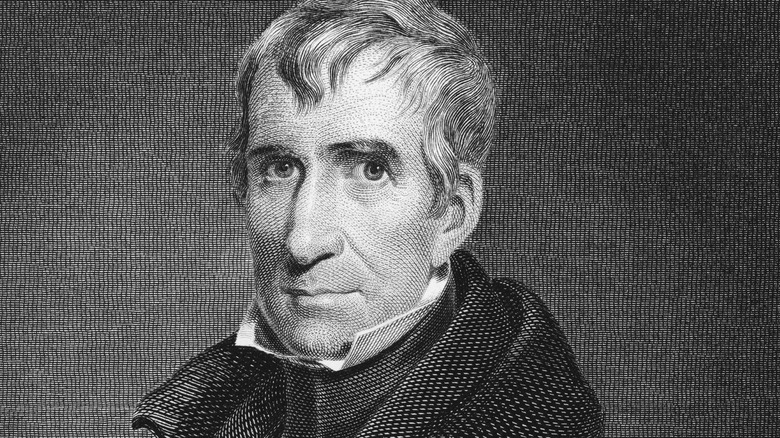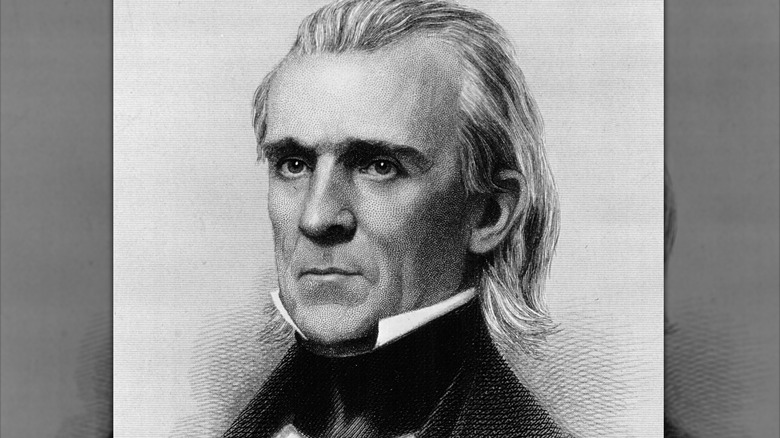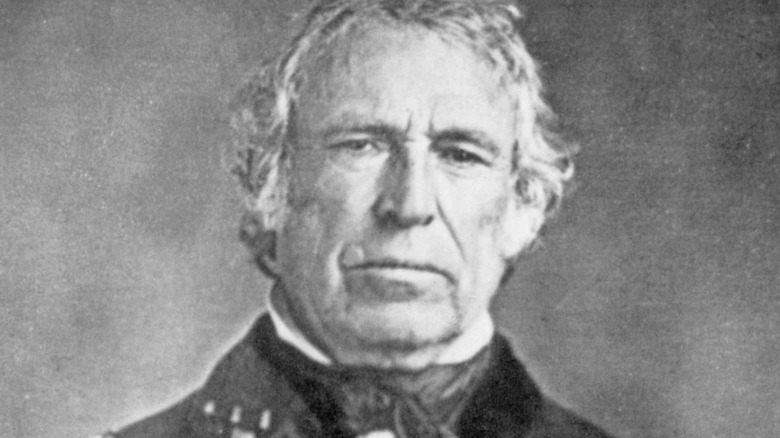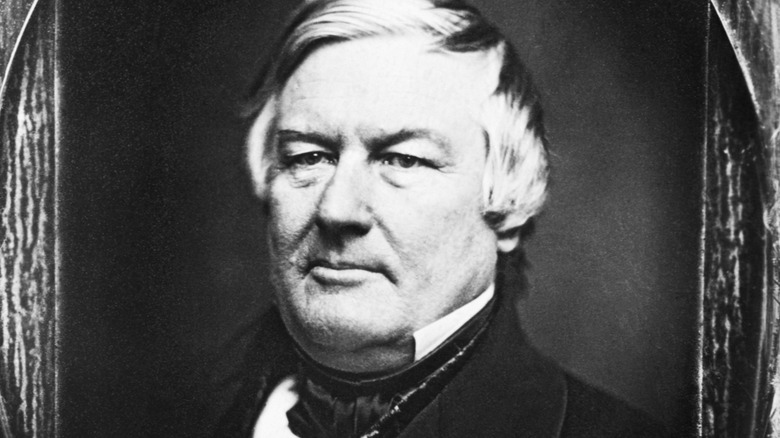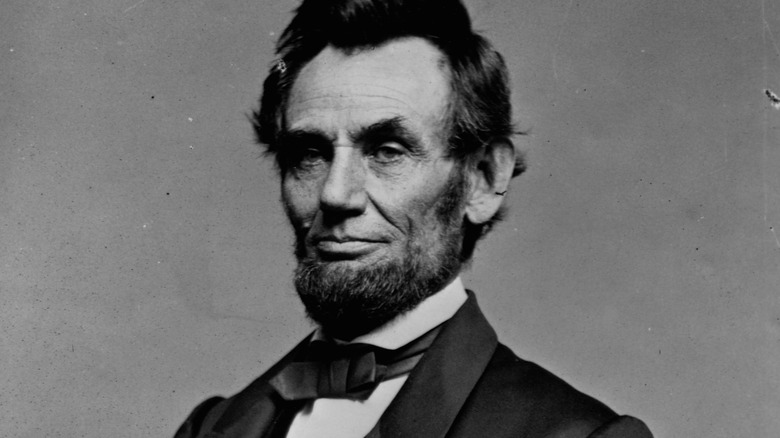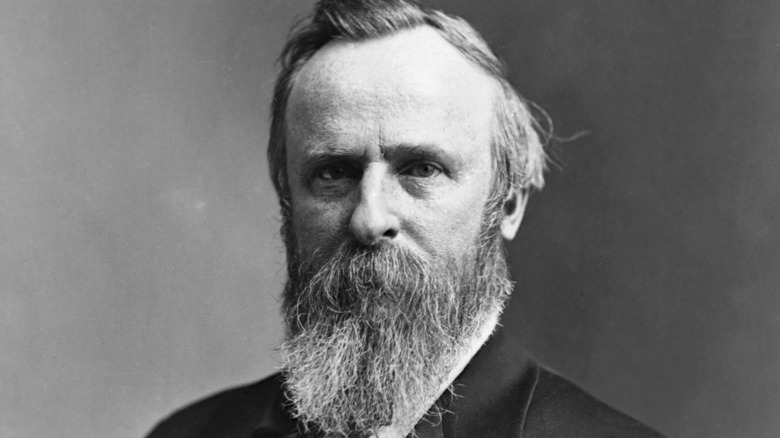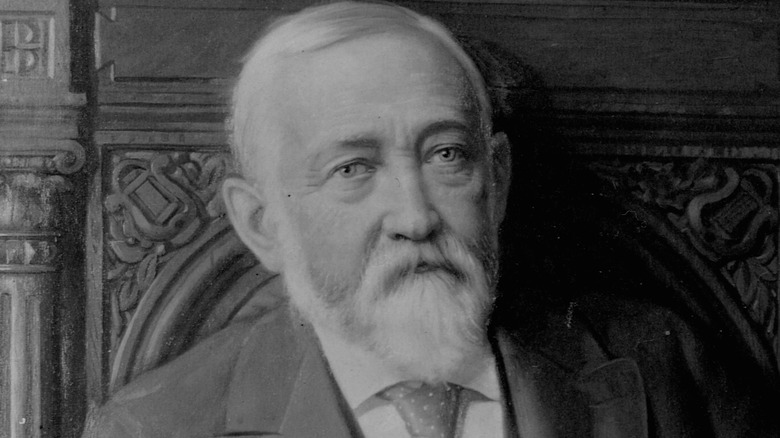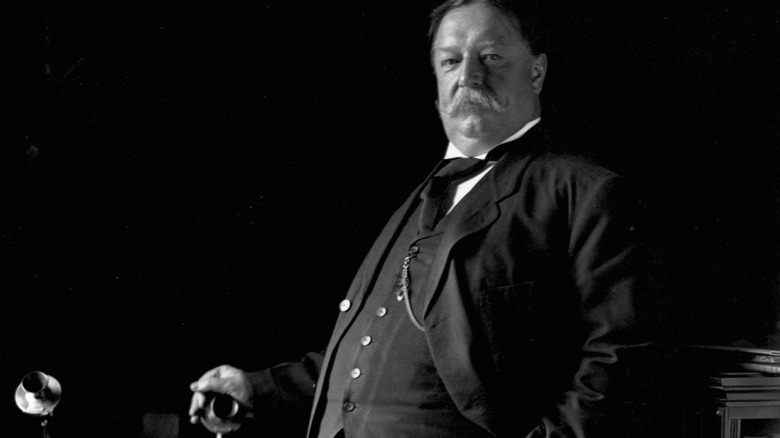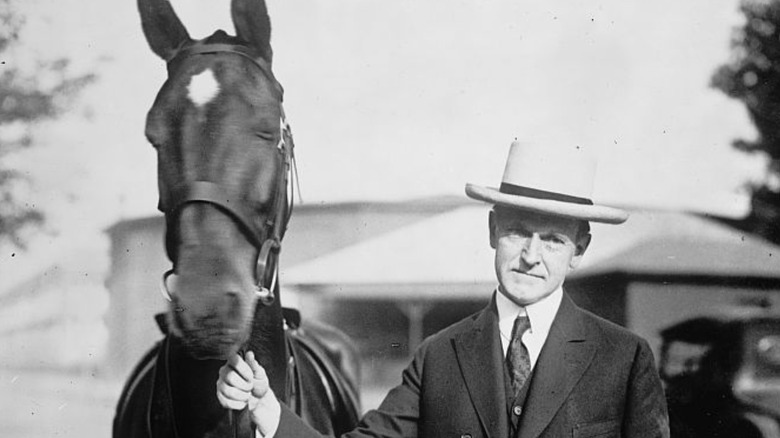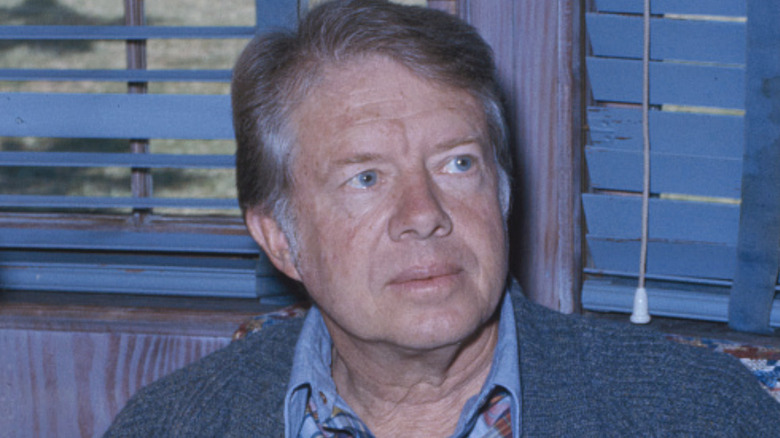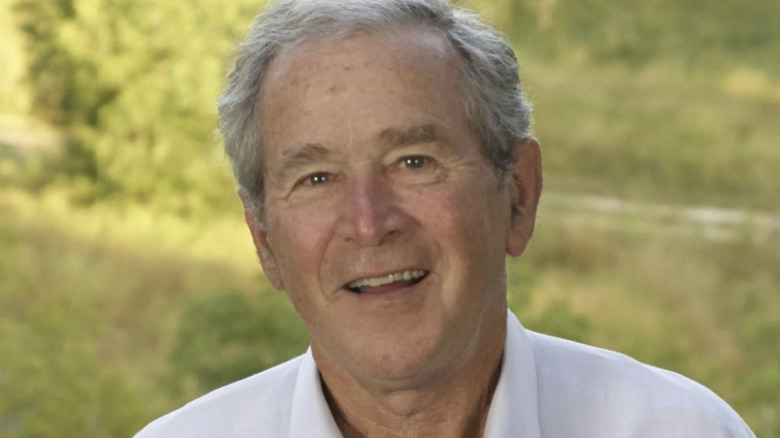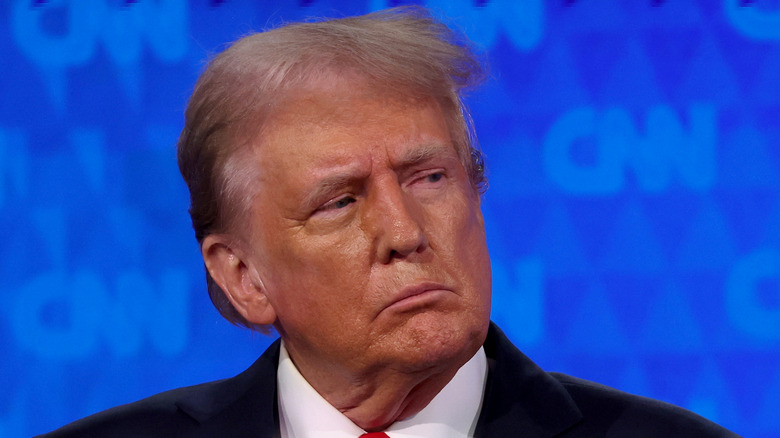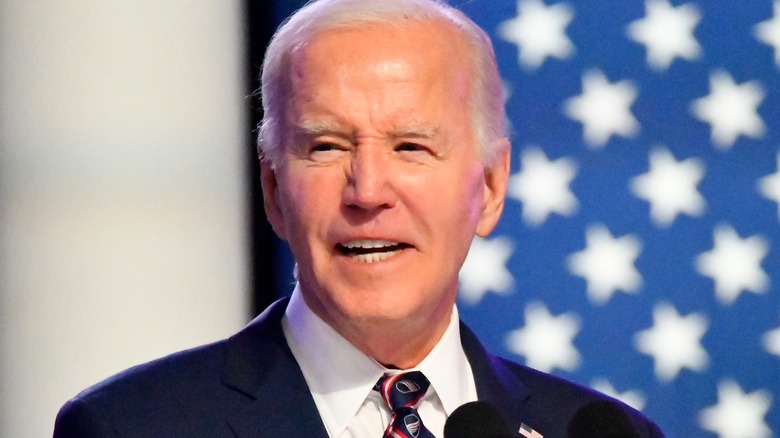13 Presidents You Likely Won't Find At The White House Happy Hour
John Adams greeted the day with hard cider and Thomas Jefferson was a wine snob (shocker), but not every U.S. president was into drinking alcohol. Boozy state dinners, throwing a few back on the golf green, or nightcaps with the wife have been standard practices for past presidents — and they didn't face much criticism for it. On the other hand, some of the nation's most sober leaders were scrutinized for their restraint. Anyone hoping to mingle with the Commander in Chief during White House happy hour wouldn't have caught so much as a glimpse of the guys on this list.
Were alcohol-embracing presidents more fun than teetotaling ones? Not necessarily, but it seems like a lot of the non-drinking presidents were pretty uptight. While "let's invite Nixon to the bar" was a phrase probably uttered by no one, at least he knew how to get down with the customary drinking habits of his international contemporaries — unlike Coolidge's prim and proper act in Cuba. Similarly, presidents whose teetotaling wives held the liquor cabinet keys hostage, fielded hems and haws from the public akin to the modern hostility of a social media comments section.
Although many of the presidents we'll discuss here didn't go their whole lives without drinking alcohol, their years in the White House were notably sober. At a White House happy hour up in the sky, you might see Jefferson leading a Madeira tasting, or Andrew Jackson batching tubs of whiskey punch. These presidents won't be there.
1. William Henry Harrison
Whisky, wine, and cider flowed freely in the early days of the White House, until ninth President William Henry Harrison entered the scene. Harrison, the son of a wealthy plantation owner and politician in Virginia, was one of the soberest presidents to take office. Yet, a tall tale about hard cider was at the center of his presidential campaign. In 1840, Harrison ran against incumbent president Martin Van Buren, who was not above dabbling in smear tactics to pull ahead of Harrison in the presidential race.
Van Buren and the Democrats portrayed Harrison as an elderly grouch, who would rather spend his days holed up in a log cabin with a barrel of hard cider than serve the American people. Harrison and the Whig Party were smart enough to flip the script, and used the image of Harrison socializing outside a log cabin with hard cider as a promotional part of his campaign. Rather than risk criticism for who he really was: a non-drinking man of privileged means, Harrison played up the façade to appear more relatable to the common man.
It worked, but the results were notoriously brief. Harrison died one month after his 1841 inauguration, making the 68-year-old's presidential term the shortest in U.S. history. It was long believed he died from pneumonia after not wearing a coat or hat on Inauguration Day. More recent accounts trace his fatal illness to typhoid fever, contracted from the White House's sewage-tainted water supply.
2. James K. Polk
President James K. Polk was a bit of an enigma. He was the original "dark horse" candidate, whose bid for vice president was upgraded to a Democratic presidential nomination (and win), thanks to his "Manifest Destiny" approach toward the nation's territorial expansion. Polk was also one of the first presidents to be remarkably unexcited about drinking.
The first U.S. president to say no to the sauce was William Henry Harrison who was the ninth President for about a month before dying from illness. Polk, the 11th president, came from a conservative Southern family, and his wife Sarah was a devout Presbyterian (Polk himself was a closet Methodist). Perhaps the most sullen man to ever rock a mullet hairstyle, Polk was the ultimate wallflower who didn't bother with friends or any interests outside of politics. Polk's withdrawn ways lent well to his workaholic leadership style, yet made for a dull time at White House social events.
Sarah Polk banned card games, liquor, dancing, and music from White House receptions. President Polk was awkward in social situations and known to look to Sarah as an advisor, so he went along with it. On rare occasions, he imbibed modest amounts of wine, which was served during formal White House dinners. Professional rival Sam Houston once called Polk "a victim of the use of water as a beverage." This may have been true. Months after leaving office, Polk contracted cholera and died at age 53.
3. Zachary Taylor
Sure, 12th president Zachary Taylor's oft-disheveled appearance and his nickname "Old Rough and Ready" give the impression of a rabble-rousing boozehound, but it wasn't like that. Taylor was the kind of guy who felt more comfortable attempting to colonize Mexico on the battlefield than he did talking smack at the bar. Historical accounts of Taylor's personal drinking habits maintain that he abstained from alcohol.
That didn't mean that Taylor was opposed to other people drinking at the White House. Taylor provided wine to White House guests on the principle of diplomacy — although he didn't receive visitors at his presidential home for long. After being in office for just 16 months, Taylor fell seriously ill after attending a Fourth of July celebration at the grounds that would soon be home to The Washington Monument.
In typical alcohol-free fashion, Taylor spent the sweltering holiday afternoon gorging on cherries and iced milk, which doctors pinpointed as the culprit of Taylor's severe gastroenteritis. He died days later, on July 9, 1850. Despite conspiracy theories that Taylor's attempts to curb the spread of slavery led to a deliberate arsenic poisoning, a case of cholera resulting from contaminated water in the Washington, D.C. area remains the most plausible cause of death.
4. Millard Fillmore
In the wake of President Zachary Taylor's sudden death in July 1850, Taylor's vice president Millard Fillmore took office. Fillmore, like his predecessor, wasn't a drinker. According to Robert J. Rayback's "Millard Fillmore: Biography of a President," a presidential visit to London in 1855 was the only time Fillmore tried alcohol.
On a tour of the city's winehouses, Fillmore recalled being "slightly fuddled by merely moistening his lips with such a variety of liquids." The founding fathers would have likely rolled their eyes at a statement like this, however, Fillmore assumed the presidency at a time when the temperance movement — also known as teetotalism — was a widespread concept. Abstaining from or at least moderating the consumption of intoxicating spirits was initially promoted by church organizations with roots in New York, and Fillmore came of age Upstate.
Fillmore was by no means the life of the party, but his comeuppance from an impoverished childhood to establishing his own law practice in Buffalo is a telling show of the man's ambition. For Fillmore, drinking, smoking, and gambling were dalliances meant for other men. In 1842, Fillmore signed the Congressional Temperance Society's constitution, which pledged, "The object of this Society shall be by example and by kind moral influence, to discountenance the use of ardent spirit and the traffic in it, throughout the community."
5. Abraham Lincoln
Any glass containing alcohol that Abraham Lincoln raised in solidarity with his countrymen was little more than a prop to keep him from looking like "a stick in the mud." What's more, he possessed a deeper understanding of alcohol's complex role in society. In 1842, years before Lincoln became the 16th president of the United States, he delivered his "Temperance Address" to the Springfield Washington Temperance Society. In the speech, Lincoln urged that compassion, not judgment, should be shown toward people who struggle to drink moderately. He also noted the "impolitic" nature of denouncing those who sell alcohol for a living.
Lincoln's words were procured from the way he lived. A Kentucky native, Lincoln and many of the locals had ties to the alcohol trade. Lincoln once owned a grocery store that sold liquor, but it's unlikely he sampled the goods much. He maintained that drinking caused him to feel "flabby and undone" — enough to keep him on the preferential side of temperance.
There might be more as to why bloated and displaced sentiments plagued Lincoln on the occasions he did hit the bottle. In the years leading up to his presidency, Lincoln took a pill known as "blue mass" to help his perpetual melancholia. The high mercury content within blue mass pills is said to have contributed to Lincoln's temper flaring up during his presidential campaign. The composed President Abe we know and love, was partly thanks to keeping blue mass — and booze — on the shelf.
6. Rutherford B. Hayes
Union Army soldier turned 19th President Rutherford Hayes was moderate in his political beliefs and his alcohol intake. Between his highly disputed victory in the 1876 election and his wife's hardcore support of the Woman's Christian Temperance Union, Hayes was inclined to do some people-pleasing. He hoped banning alcohol from the White House would help restore the federal government's integrity, but the new rule didn't take effect right away.
Hayes, who was known to have the occasional beer or partake in military celebrations where drinking went down, decided to serve wine at the first official state dinner. The temperance advocates caught wind of it and the new presidential couple felt the pressure. Lucy Hayes was expected to be a role model for the Woman's Christian Temperance Union and the president, who was focused on post-war reform, wasn't trying to deal with unnecessary in-fighting. Thus, the couple agreed that the White House would be dry for the rest of the president's term.
Of course, the Hayes' alcohol restriction didn't sit well with everyone. Critics referred to the First Lady as "Lemonade Lucy" — though no one actually said that to her face. When it was rumored that disgruntled White House staffers snuck alcohol-infused oranges into a zero-proof Roman Punch at a function, Hayes said no such thing occurred. He clarified that the punch was merely flavored with juniper to mimic that taste of the traditionally more spirited Roman Punch.
7. Benjamin Harrison
Grandson of fellow teetotaling president William Henry Harrison, Benjamin Harrison's one-term presidency was about as memorable as his grandpa's one month in office. His administration is perhaps best known for being in between Grover Cleveland's non-consecutive terms (the only president to date to pull off that feat). Harrison was one of the few presidents who didn't drink at all. We're not saying that alcohol makes people more fun, but by historical accounts, Harrison wasn't packing much in the vivaciousness department.
It is said that Harrison's only vices were cucumbers and cigars and that shaking his hand was like holding a dead fish — ouch. Character defects aside, Harrison also held the reputation of being a family man and was the first former president to hold a professorship at a college when he taught at Stanford. As far as White House happy hour is concerned, it's safe to say that Harrison would have sat it out. Harrison's wife was more inclined to serve clear hot soup at White House receptions than alcohol of any kind.
8. William H. Taft
He was president prior to Prohibition, yet Taft was more or less a teetotaler before alcohol in America was banned by law. Historic accounts note that Taft wasn't adverse to those in his presidential company partaking in a few drinks, but he was hardly tempted. Then again, Taft had his health to consider.
Long known as the heaviest man to ever take executive office, Taft's teetotaling ways (which allegedly started up before he took office), were primarily for physical health reasons. Taft was aligned with the Temperance Movement, and favored "simmon beer" a beverage brewed from persimmon fruits. When asked about his views on Prohibition, Taft said that while he was not a drinking man himself, he opposed it on the federal level, but saw its merits on a more regional level. Taft remained active in politics, serving as Chief Justice until his death from heart disease in 1930.
9. Calvin Cooldige
Rumor has it that when quippy New York writer Dorothy Parker was seated near President Calvin Coolidge at a dinner party, she told him about a bet she had with her friend. Parker wagered she could get more than two words out of the stoic Commander in chief, to which Silent Cal replied, "You lose." A pent up guy like Coolidge didn't bother much with booze — and he definitely didn't rely on it to socialize. On the occasions he did imbibe, it was done in near solitude.
His preferred poison for these seldom sip-sessions was Tokay, a sweet white wine from Hungary's Tokaj district. One sweet beverage that couldn't lure the 30th president out of his shell was El Presidente, a rum cocktail featuring vermouth, curaçao, and grenadine. Coolidge famously turned it down at an official state dinner in Cuba, where he was the guest of honor. Cuban President Gerardo Machado brought in an expert mixologist to prepare rounds of El Presidente for guests, but Coolidge preferred to toast his fellow dignitaries with water.
We're cutting Coolidge some slack considering that his tight-lipped turn at the state dinner occurred in 1928 during U.S. Prohibition. Coolidge wasn't a staunch prohibitionist, and you know, "When in Rome" (or in this case, Havana), but there was a lingering expectation to lead by example. Or maybe he was just holding out for his private tipple of Tokay.
10. Jimmy Carter
Former president Jimmy Carter (who turns 100 on October 1, 2024), is not your run of the mill teetotaler, but he played the part of one during his years as president. His wholesome, country boy image wasn't an act though – Carter was a Georgia peanut farmer who actually seemed like he cared about people. During Carter's term, which spanned from 1977 to 1981, foreign tensions were high and the U.S. economy was a mess. Even so, he and the rest of the White House staff had no choice but to keep a clear head — Carter cleared all the liquor from the premises.
Carter may have denounced the tax deductible "three-martini lunches" of big-city businessmen (he disliked tax loopholes and day drinking), but he wasn't anti-alcohol. Later on in life, he was pretty serious about making wine. Carter has said that winemaking is a multi-generational family tradition. To better inform his palette, he and his late wife Rosalynn traveled all over the world tasting wine on different continents.
11. George W. Bush
Living in your father's shadow can be tough on the ego, and 43rd President George W. Bush knows this all too well. As a Yale University freshman in 1964, G.W. was staring down a long legacy of family alumni, including his father and grandfather. Young and unfocused, Bush found comfort in the "good old boy" aspects of Yalie tradition: frat parties, secret society meetings, and football games — all activities that allowed the would-be president to drink with abandon.
Bush referred to his drink(s) of choice as "the four B's" — beer, bourbon, and B&B (Benedictine liqueur and brandy) and was known to consume all of them in one sitting. In his college days, Bush was prone to pulling idiotic pranks while inebriated (he was arrested for disorderly conduct after stealing a Christmas wreath off a storefront but the charges were later dropped). As an adult, he was a habitual binge drinker.
"Once he got started, he couldn't, didn't shut it off," a friend told The Washington Post in 1999. Bush's proclivities came to a head after a raucous 40th birthday celebration left him with a hangover and an existential crisis. Former First Lady, Laura Bush said the birthday bash wasn't wilder than any other weekend, but he simply felt ready to stop. Bush has been sober ever since.
12. Donald Trump
Donald J. Trump is a lot of things, but boozer is not one of them. For years, Trump has stuck to the story that he's never even tried a glass of alcohol, something he described in a 2018 press conference as "one of my only good traits." The former president revealed that he doesn't drink alcohol because his older brother, Fred Trump Jr., was an alcoholic who died young.
Despite his charisma and good looks, Fred Jr. developed a serious alcohol problem while attending flight school. Trump said that Fred repeatedly told him not to drink and that he listened. Fred passed away in 1981 at the age of 42, from a heart attack brought on by excessive drinking. Trump has expressed regret over aggressively pressuring Fred Jr. to join the family business when he wanted no part of it.
Trump maintains he's a Diet Coke man, however, fellow movers and shakers of the '80s and '90s Manhattan club scene paint a different picture. One bartender recalls Trump nursing light beers –- no more than three a night. A club owner from those days says he witnessed Trump drink champagne or liquor while hanging out with Elite Model Management founder John Casablancas, who Trump relied on as a wingman.
13. Joe Biden
Trump and Biden don't see eye to eye on anything really, except living the sober life. In the past, Biden has explained that he never picked up the bottle because he saw the heart-wrenching effects of alcoholism in his family and his neighborhood growing up. Biden, the oldest of four children, told his younger siblings he would pay them $100 each if they didn't drink before they turned 21. His brother Frank would eventually battle alcohol dependency.
Biden also advised his sons not to drink due to the history of alcoholism in the family, but his youngest son Hunter ultimately experienced struggles similar to those his elders faced. Hunter has been forthcoming about his drug and alcohol addictions and numerous rehab visits, though his past behaviors have often served as fodder for Biden's political opponents. Biden is one of the few presidents in U.S. history who has never drank alcohol, so he probably won't be making any appearances at the White House happy hour — unless they're serving orange Gatorade, since it's his favorite.
